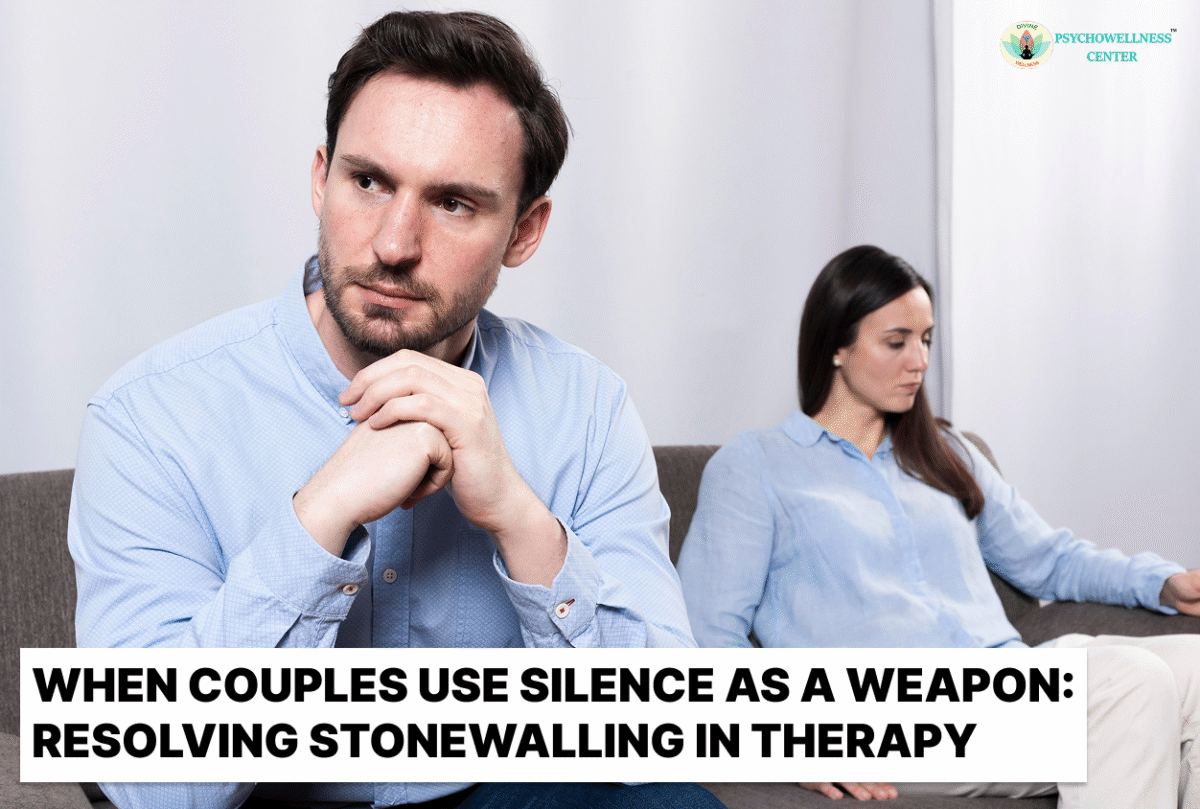Stonewalling—shutting down, withdrawing, or refusing to engage—is a powerful relational barrier. It undermines intimacy and trust, triggers stress, anxiety, depression, and often stems from unresolved trauma. Below, we explore how couples counselling, CBT, DBT, and related therapies can heal this pattern.
What Is Stonewalling & Why It Matters
Stonewalling occurs when one partner emotionally withdraws during conflict—often due to feeling physiologically flooded or overwhelmed. It not only halts dialogue but also breeds resentment, erodes emotional intimacy, and damages trust.
Even when unintentional, such silence is experienced as rejection. Over time, perched on trauma or anxiety, stonewalling can become a habitual defence—sometimes evolving into deliberate control or emotional abuse.
The Emotional Toll: Stress, Anxiety, Depression, & Trauma
Stonewalling doesn’t just damage the bond—it damages individuals:
- Stress & Anxiety: Both partners experience elevated physiological stress (like cortisol spikes), triggering flooding and difficulty regulating emotions.
- Depression: Chronic withdrawal and unspoken hurts contribute to feelings of isolation, low mood, and self-doubt.
- Trauma: For those with past wounds—even childhood attachment trauma—stonewalling can re-trigger fears about safety and abandonment, reinforcing maladaptive patterns.
Therapy Approaches to Rebuild Intimacy & Trust
- Cognitive Behavioural Therapy (CBT) & Behavioural Couples Therapy: CBT (or CBCT for couples) helps identify negative thought patterns—like catastrophizing or all-or-nothing thinking—and replace them with constructive communication rituals. This strategy fosters trust, emotional regulation and reduces conflict cycles.
- Integrative Behavioural Couples Therapy balances acceptance and change: partners learn not just to alter behaviours but also to understand the emotional histories behind them—key for patterns like withdrawal or avoidance.
- Dialectical Behaviour Therapy (DBT): DBT brings mindfulness, distress tolerance, and emotion regulation skills into relationships. Individuals learn to notice when they feel emotionally overwhelmed and use tools—such as deep breathing or a “time-out”—instead of stonewalling silence. These tools reduce anxiety and prevent shutdown behaviours.
Role of Couples Therapy & Counselling
Skilled relationship counselling can guide couples to:
- Rebuild trust by acknowledging damaged communication and committing to consistent, transparent behaviour.
- Revive intimacy, both emotional and physical, through structured exercises, scheduled connection, and vulnerability practice.
- Learn to avoid the Four Horsemen, including stonewalling, using strategies like “soft starts,” repairs, and emotional validation techniques from the Gottman Method.
- Practice communication tools: active listening, I-statements, emotional validation, and respectful boundary setting—foundational for deeper intimacy and reducing anxiety or reactivity.
Couples therapy often includes an initial assessment to uncover history, trauma, and communication patterns followed by goal-setting to restore emotional safety and support.
Healing the Cycle: Step-by-Step
- Self-awareness & psychoeducation: Stonewallers benefit from developing awareness of their internal state: noticing stress, fear, or past trauma cues, and learning to communicate emerging needs.
- Emotion regulation & distress tolerance exercises: Whether via DBT or CBT techniques, both partners can practice techniques to calm the nervous system in the moment—deep breathing, mindfulness, gentle movement or stepping away with a mutual agreement to return.
- Rebuilding Intimacy & Trust: Therapy may involve shared exercises: love-maps, gratitude journaling, rituals of connection. These rebuild emotional closeness and recovery from low-trust wounds or betrayals.
- Trauma-informed support: When stonewalling traces back to relationship trauma—emotional neglect, betrayal, or attachment wounds—therapies like trauma-sensitive CBT, somatic approaches, or DBT-informed coaching help individuals become aware of triggers and heal trust and safety internally.
Benefiting Both Partners
- The stonewaller gains insight into emotional triggers and healthier coping alternatives (instead of isolation).
- The partner who experiences stonewalling can communicate unmet needs, express feelings of disconnection, and learn self-soothing approaches to combat anxiety or fear of abandonment.
- Both can reduce stress, anxiety, and depression by interrupting cycles and repairing emotional safety.
Final Thoughts
When silence is weaponised or becomes an automatic response, couples often lose intimacy, trust, and emotional harmony. However, healing is possible—through insight, evidence-based therapy, and mutual commitment. Stonewalling can be transformed into vulnerability, stress and anxiety can be eased, intimacy can deepen, and trust can be rebuilt.
Relationship counselling, rooted in approaches like CBT, DBT, and the Gottman method, provides couples with a roadmap to move from withdrawal to reconnection—and from disconnection to lasting emotional safety.
If you’ve ever found yourself searching for the best psychologist near me, know that support is available. At the Psychowellness Center, with clinics in Dwarka Sector-17 and Janakpuri (Contact: 011-47039812 / 7827208707), trained psychologists offer therapies such as Emotionally Focused Therapy (EFT), Cognitive Behavioural Therapy (CBT), and couples counselling to address attachment insecurities, rebuild trust, and improve emotional connection. For those seeking flexible, confidential support from home, TalktoAngel, a leading online counselling platform, connects clients with licensed therapists who specialise in relationship issues, divorce recovery, and attachment healing.
Together, these services create safe spaces for emotional expression and growth—helping individuals and couples not only navigate relationship challenges with compassion, but also build the resilience needed to form healthier, more secure connections in the future.
Contribution: Dr. R.K. Suri, Clinical Psychologist, and Ms. Nancy Singh, Counselling Psychologist
Reference
- Pistorello, J., Fruzzetti, A. E., MacLane, C., & Iverson, K. M. (2012). Dialectical Behaviour Therapy (DBT) applied to college students: A randomised clinical trial. Journal of Consulting and Clinical Psychology, 80(6), 982–995. https://doi.org/10.1037/a0030226
- Research on the treatment of couple distress. Journal of Marital and Family Therapy, 38(1), 145–168. https://doi.org/10.1111/j.1752-0606.2011.00249.x
- Cognitive-behavioral couple therapy. In A. S. Gurman, J. Lebow, & D. K. Snyder (Eds.), Clinical handbook of couple therapy (5th ed., pp. 23–60). Guilford Press.

